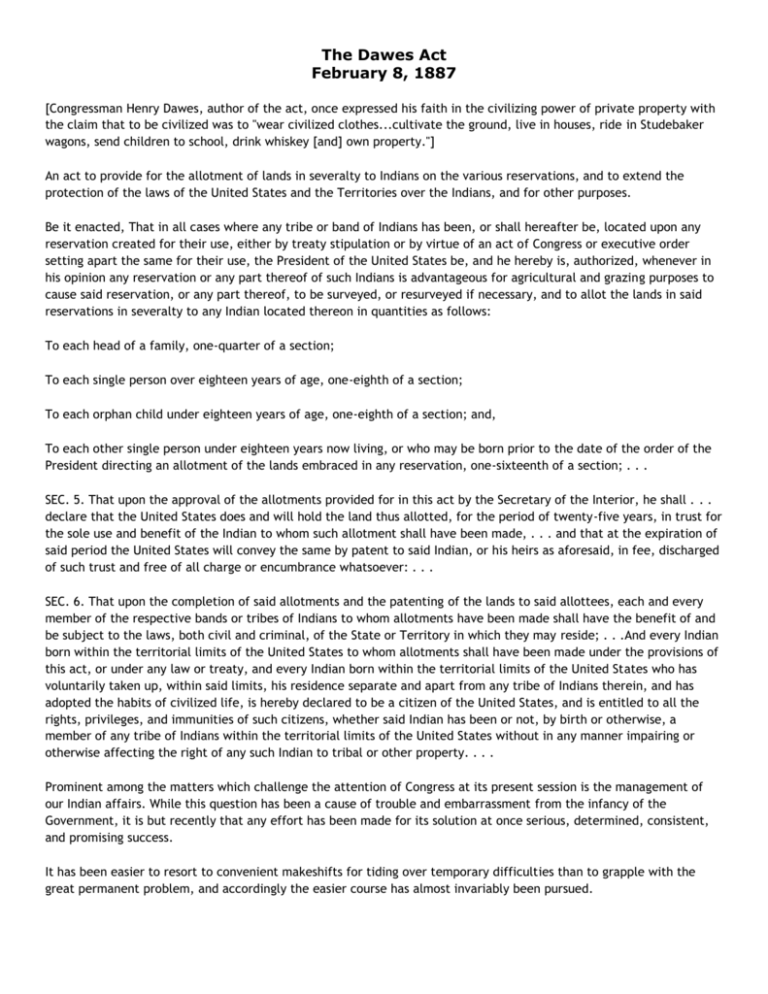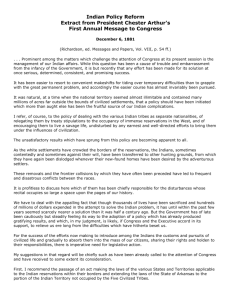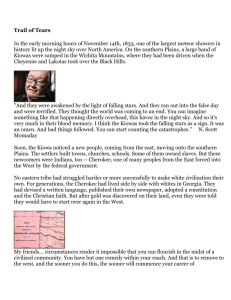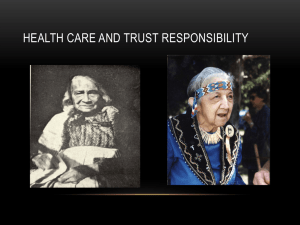Questions to Ask about the Dawes Act
advertisement

The Dawes Act February 8, 1887 [Congressman Henry Dawes, author of the act, once expressed his faith in the civilizing power of private property with the claim that to be civilized was to "wear civilized clothes...cultivate the ground, live in houses, ride in Studebaker wagons, send children to school, drink whiskey [and] own property."] An act to provide for the allotment of lands in severalty to Indians on the various reservations, and to extend the protection of the laws of the United States and the Territories over the Indians, and for other purposes. Be it enacted, That in all cases where any tribe or band of Indians has been, or shall hereafter be, located upon any reservation created for their use, either by treaty stipulation or by virtue of an act of Congress or executive order setting apart the same for their use, the President of the United States be, and he hereby is, authorized, whenever in his opinion any reservation or any part thereof of such Indians is advantageous for agricultural and grazing purposes to cause said reservation, or any part thereof, to be surveyed, or resurveyed if necessary, and to allot the lands in said reservations in severalty to any Indian located thereon in quantities as follows: To each head of a family, one-quarter of a section; To each single person over eighteen years of age, one-eighth of a section; To each orphan child under eighteen years of age, one-eighth of a section; and, To each other single person under eighteen years now living, or who may be born prior to the date of the order of the President directing an allotment of the lands embraced in any reservation, one-sixteenth of a section; . . . SEC. 5. That upon the approval of the allotments provided for in this act by the Secretary of the Interior, he shall . . . declare that the United States does and will hold the land thus allotted, for the period of twenty-five years, in trust for the sole use and benefit of the Indian to whom such allotment shall have been made, . . . and that at the expiration of said period the United States will convey the same by patent to said Indian, or his heirs as aforesaid, in fee, discharged of such trust and free of all charge or encumbrance whatsoever: . . . SEC. 6. That upon the completion of said allotments and the patenting of the lands to said allottees, each and every member of the respective bands or tribes of Indians to whom allotments have been made shall have the benefit of and be subject to the laws, both civil and criminal, of the State or Territory in which they may reside; . . .And every Indian born within the territorial limits of the United States to whom allotments shall have been made under the provisions of this act, or under any law or treaty, and every Indian born within the territorial limits of the United States who has voluntarily taken up, within said limits, his residence separate and apart from any tribe of Indians therein, and has adopted the habits of civilized life, is hereby declared to be a citizen of the United States, and is entitled to all the rights, privileges, and immunities of such citizens, whether said Indian has been or not, by birth or otherwise, a member of any tribe of Indians within the territorial limits of the United States without in any manner impairing or otherwise affecting the right of any such Indian to tribal or other property. . . . Prominent among the matters which challenge the attention of Congress at its present session is the management of our Indian affairs. While this question has been a cause of trouble and embarrassment from the infancy of the Government, it is but recently that any effort has been made for its solution at once serious, determined, consistent, and promising success. It has been easier to resort to convenient makeshifts for tiding over temporary difficulties than to grapple with the great permanent problem, and accordingly the easier course has almost invariably been pursued. It was natural, at a time when the national territory seemed almost illimitable and contained many millions of acres far outside the bounds of civilized settlements, that a policy should have been initiated which more than aught else has been the fruitful source of our Indian complications. I refer, of course, to the policy of dealing with the various Indian tribes as separate nationalities, of relegating them by treaty stipulations to the occupancy of immense reservations in the West, and of encouraging them to live a savage life, undisturbed by any earnest and welldirected efforts to bring them under the influences of civilization. The unsatisfactory results which have sprung from this policy are becoming apparent to all. As the white settlements have crowded the borders of the reservations, the Indians, sometimes contentedly and sometimes against their will, have been transferred to other hunting grounds, from which they have again been dislodged whenever their new-found homes have been desired by the adventurous settlers. These removals and the frontier collisions by which they have often been preceded have led to frequent and disastrous conflicts between the races. It is profitless to discuss here which of them has been chiefly responsible for the disturbances whose recital occupies so large a space upon the pages of our history. We have to deal with the appalling fact that though thousands of lives have been sacrificed and hundreds of millions of dollars expended in the attempt to solve the Indian problem, it has until within the past few years seemed scarcely nearer a solution than it was half a century ago. But the Government has of late been cautiously but steadily feeling its way to the adoption of a policy which has already produced gratifying results, and which, in my judgment, is likely, if Congress and the Executive accord in its support, to relieve us ere long from the difficulties which have hitherto beset us. For the success of the efforts now making to introduce among the Indians the customs and pursuits of civilized life and gradually to absorb them into the mass of our citizens, sharing their rights and holden to their responsibilities, there is imperative need for legislative action. My suggestions in that regard will be chiefly such as have been already called to the attention of Congress and have received to some extent its consideration. First. I recommend the passage of an act making the laws of the various States and Territories applicable to the Indian reservations within their borders and extending the laws of the State of Arkansas to the portion of the Indian Territory not occupied by the Five Civilized Tribes. The Indian should receive the protection of the law. He should be allowed to maintain in court his rights of person and property. He has repeatedly begged for this privilege. Its exercise would be very valuable to him in his progress toward civilization. Second. Of even greater importance is a measure which has been frequently recommended by my predecessors in office, and in furtherance of which several bills have been from time to time introduced in both Houses of Congress. The enactment of a general law permitting the allotment in severalty, to such Indians, at least, as desire it, of a reasonable quantity of land secured to them by patent, and for their own protection made inalienable for twenty or twenty-five years, is demanded for their present welfare and their permanent advancement. In return for such considerate action on the part of the Government, there is reason to believe that the Indians in large numbers would be persuaded to sever their tribal relations and to engage at once in agricultural pursuits. Many of them realize the fact that their hunting days are over and that it is now for their best interests to conform their manner of life to the new order of things. By no greater inducement than the assurance of permanent title to the soil can they be led to engage in the occupation of tilling it. The well-attested reports of the their increasing interest in husbandry justify the hope and belief that the enactment of such a statute as I recommend would be at once attended with gratifying results. A resort to the allotment system would have a direct and powerful influence in dissolving the tribal bond, which is so prominent a feature of savage life, and which tends so strongly to perpetuate it. Third. I advise a liberal appropriation for the support of Indian schools, because of my confident belief that such a course is consistent with the wisest economy. . . Questions to Ask about the Dawes Act 1. Who were the most active sponsors of the Dawes Act? 2. Were the sponsors aware of whether or not the kind of land allotted under the Dawes Act was actually suitable for farming? 3. Was it unreasonable to believe that private property and farming were superior to communally held land devoted to hunting, gathering and/or farming? 4. What role, if any, did Indians themselves play in arguing for or against the Dawes Act? 5. What happened to land not allotted to Indians? What does this show about possible motives of the plan? Questions from both readings 1. After students have read the first document make two columns on the black board, one labeled "problems" and the other "solutions." Elicit from students the following information and list their answers on the board: 2. What problems does Arthur identify regarding the U.S. government and the Indians? List them. 3. What solutions does Arthur offer to remedy the situation? 4. Whom does Arthur blame, if anyone, for the sorry state of Indian and U.S. relations? 5. What is the "tone" of his speech? 6. How does Arthur view American Indians? 7. What do you think are his sources of information? 8. What is your opinion of the solutions he puts forth? Debate them one by one. Now turn to the extract from the Dawes Act In what ways does the Dawes Act seems to remedy the problems identified by Arthur? In what ways does the act seem to be protecting Indians? In what way(s) does the act weaken and dismantle the power of Indian nations? What do you predict will be the outcome of the Dawes Act on Indian nations?









